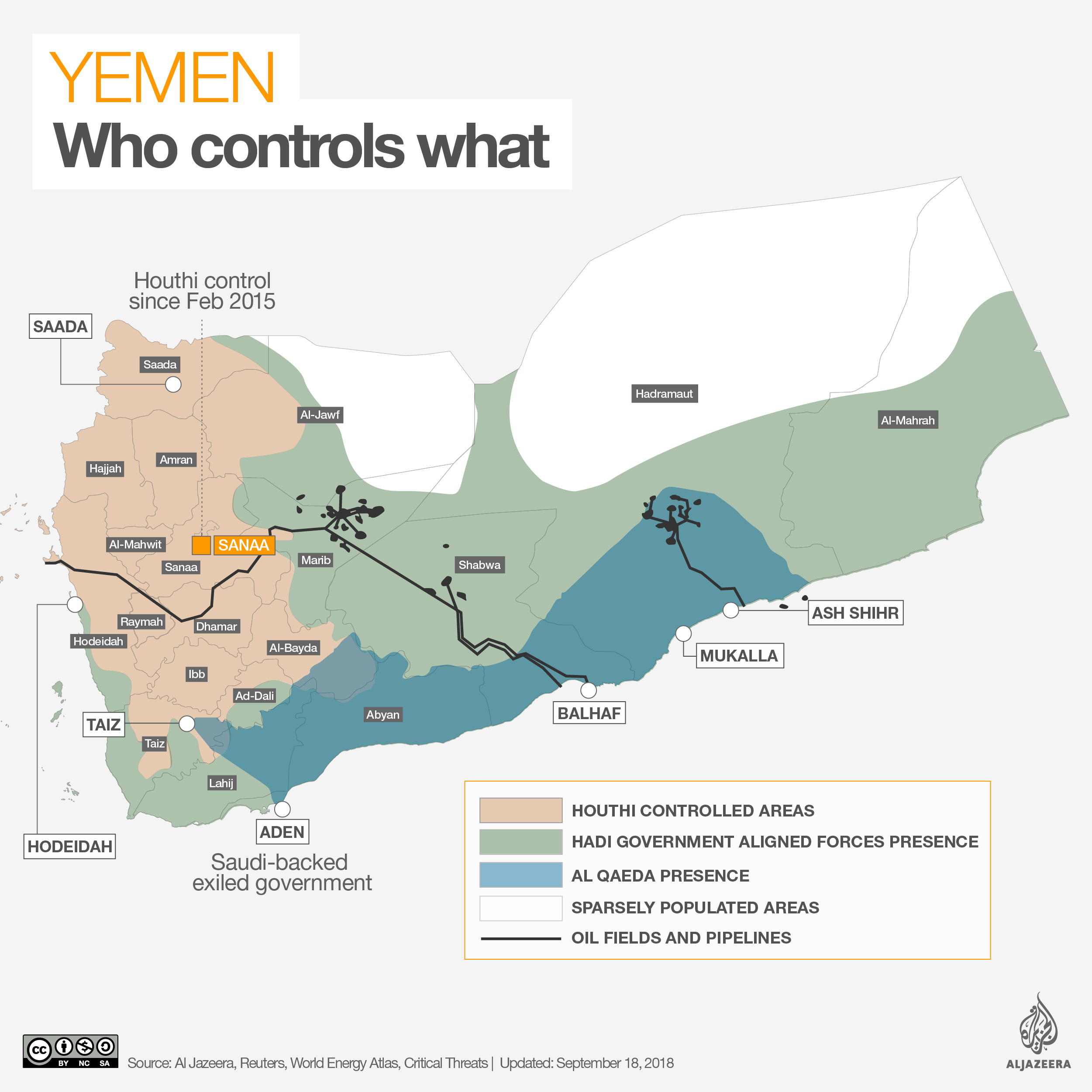‘This shouldn’t be happening’: Civilian deaths spike in Yemen
Save the Children says 349 civilians have been killed since June when Saudi-UAE alliance launched assault on Hodeidah.

At least 349 civilians have been killed in Yemen’s Houthi-held city of Hodeidah since June 13 when Saudi Arabia, the United Arab Emirates (UAE), and Yemeni government forces launched an offensive to retake the strategic seaport.
Citing numbers collated by the monitoring group, ACLED (Armed Conflict Location and Event Data), Save the Children said on Monday that Hodeidah accounted for 51 percent of all civilian casualties between June and the end of August.
Keep reading
list of 4 itemsUS sanctions shipping firm accused of links to Iran, Yemen’s Houthis
Vessel struck in Red Sea as Houthis promise attacks on more shipping lanes
What we know about deadly Houthi attack on cargo ship
At least 685 civilians had been killed across the country during that period, the organisation added.
Fighting in Hodeidah – the main gateway for imports of relief supplies and commercial goods into the country – escalated on June 13 when the Saudi-UAE alliance launched a wide-ranging operation to retake the city from the Houthi rebels.
Riyadh and Abu Dhabi see Hodeidah as the main entry point for weapons for the Houthis and have accused their regional rival Iran of sending missiles to the rebels, a charge Tehran has denied.
In the first five months of this year, there were an average 44 civilian casualties every month in Hodeidah.
|
|
Between June and August, the figure jumped to a monthly average of 116, an increase of 164 percent, the charity said.
Save the Children spokesman Bhanu Bhatnagar lamented the situation, describing it as “dire”.
“We’re extremely concerned for the people who are trapped there but also for the welfare of people who have left their homes and are now living in makeshift shelters,” he said.
“There are many people who don’t have access to clean drinking water and so we could see another potential outbreak of cholera.
“The hunger crisis is also entirely man-made. More than three years of heavy fighting, the indiscriminate use of weapons in populated areas and the blockade have pushed millions of children to the brink of starvation.
“The people of Yemen are facing multiple threats because of this conflict. This should not be happening in 2018.”
‘Children are paying the price’
Speaking from New York, where world leaders will gather for the UN General Assembly, Helle Thorning-Schmidt, CEO of Save the Children, described the situation in Yemen as a “war on children”.
“In the past few months, we’ve seen a shocking spike in violence – from an airstrike that hit a school bus full of children to a bombing near a hospital. Battles are being fought in densely populated urban areas and children end up trapped on the front line, risking death or life-changing injuries,” Thorning-Schmidt said.
“This is a war on children. The world seems to be accepting an outrageous disregard for the conventions of war and children are paying the price.”
Aid agencies have warned that an assault on Hodeidah could shut down one of the last remaining lifelines for millions of hungry civilians. Out of a population of 28 million people, eight million – a number greater than the entire population of Switzerland – are on the verge of famine.
|
|
According to the UK-based charity, Yemen’s depreciating currency, the riyal, and collapsing economy have also contributed to pushing communities towards starvation.
Food prices have increased by an average of 68 percent since 2015, and the riyal has depreciated nearly 180 percent.
While the official exchange rate is 250 Yemeni riyals to the dollar, the unofficial market rate is 600.
The price of fuel commodities like petrol, diesel and cooking gas increased by 25 percent since November 2017 and the price of food has doubled in some parts of the country, the charity added.
The United Nations has spent the past few weeks scrambling to mediate between the warring sides, with the UN special envoy for Yemen, Martin Griffiths, holding face-to-face talks with the group’s leader, Abdul Malik al-Houthi in Sanaa.
The war in Yemen, the region’s poorest country, started in 2014 when the Houthis advanced south from their stronghold of Saada and captured large parts of the north, including Sanaa.
The conflict escalated in 2015 when Saudi Arabia and the UAE led a coalition that launched air raids in an attempt to reinstate the internationally recognised government of President Abu-Rabbu Mansour Hadi.
With logistic support from the US, the Saudi-UAE alliance has carried out more than 16,000 raids on Houthi-held areas in an attempt to reverse their gains.
These attacks have targeted weddings and hospitals as well as water and electricity plants, killing and wounding thousands.
